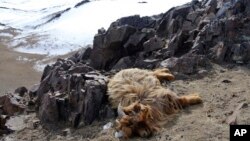Tens of thousands of nomadic herders in Mongolia face hunger and the loss of their livelihoods, the Red Cross warned Thursday, as temperatures plummet and heavy snow blankets much of the country for a second straight winter.
In December, the Mongolian government asked international agencies to provide aid to the most vulnerable herder households who are suffering extreme winter conditions known as a “dzud.”
The dzud is peculiar to the landlocked Asian nation and has become more frequent in recent years. It occurs when a summer drought is followed by a harsh winter, causing widespread deaths among the livestock, which herding families rely on for food, transport and income.
More than 157,000 people across 17 of 21 provinces are affected by this year’s dzud, said Nordov Bolormaa, secretary-general of the Mongolian Red Cross. More than 70 percent of the country is covered in snow, according to the government.
Heavy snow, frigid cold
“Now it’s very cold — temperatures are reaching minus 40 degrees Celsius (-40 F) in the northern provinces,” said Bolormaa, adding that snowstorms started a month early last year, at the end of October.
The Red Cross launched an appeal Thursday for $654,000 to help 11,300 people with cash, health services and other support.
Around 30 percent of Mongolia’s 3 million population lives off animal herding, according to the World Bank, and meat is the primary source of food.
Mongolian government figures show more than 42,000 animals had died by early February. The Red Cross warns that number will soar as severe weather is expected to continue through March.
As many as 1.1 million livestock died last winter, and the dzud of 2009-2010, one of the most severe in history, saw 9.7 million livestock deaths.
Mongolia is already struggling with an economic crisis, as a weak local currency has made household goods more expensive.
In the last 27 years, Mongolia has experienced seven dzuds, Bolormaa said, when one in 12 years would be more normal. Now the dzud has hit Mongolia two years in a row.
Climate changing
While some environmental groups point the finger at climate change, Maarten van Aalst, director of the Netherlands-based Red Cross Red Crescent Climate Centre, said it was hard to make the link with certainty because the dzud is a complex phenomenon.
“What we do know, generally, is that extremes are increasing and the predictability of what we can expect as a normal climate in a particular place is gone now,” he said by telephone.
Other factors such as denser population and herding patterns could be compounding the effects of the dzud, he noted.
Herders forced into city
Its growing frequency has resulted in mass migration of out-of-work herders to Mongolia’s capital Ulaanbaatar, putting a strain on the city over the last decade.
Migrants end up living in “ger districts,” makeshift neighborhoods named after traditional yurt dwellings, where they burn coal, tires and household waste to keep warm, creating massive pollution.
To help protect herders from climate-related losses to their livestock, the World Bank in Mongolia launched the world’s first index-based livestock insurance scheme in 2005.
Since adopted by the Mongolian government, it is based on an index of livestock mortality rates by species and district, and offered through local insurance companies and banks.
But take-up has been slow. In 2016, close to 19,000 herding households were insured, or around 12 percent of the total, according to Ulziibold Yadamsuren, former director of the program at the World Bank.
The cost of insurance is high for poor herders, and they cannot meet some of the criteria such as a requirement for all livestock to be vaccinated, said the Red Cross’s Bolormaa.





